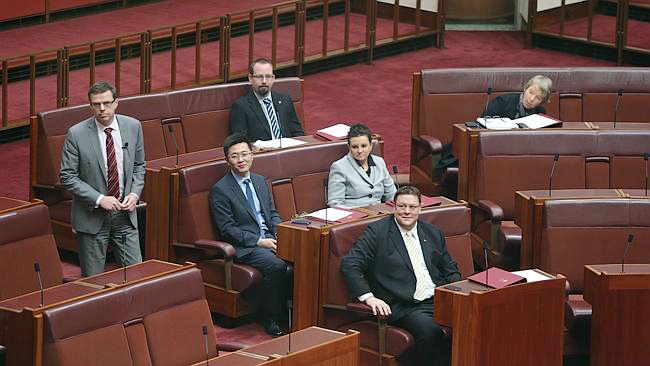We owe it to our obstructing Senate for helping to reveal the true cost of abandoning carbon pricing. [15 July 2014 | Peter Boyer]

Senators Ricky Muir (seated, top centre), Janet Rice (top right), Zhenya Wang, Jacqui Lambie and Glenn Lazarus taking their seats in the Senate for their introduction to Senate procedure. PHOTO DAILY TELEGRAPH, SYDNEY
If it hadn’t actually happened, no-one would believe the story of the lingering death of Australia’s carbon pricing scheme. So absurd, it seems like a dream. But for the government it’s been a nightmare.
The plot has deviated wildly from the plan announced by Tony Abbott over a year ago, well ahead of the election. That scenario had a submissive parliament acting quickly and without fuss to repeal the carbon tax and abolish all the Labor-Green abatement apparatus.
Instead, the Abbott government has found itself embroiled in a protracted debate on climate policy, in which it’s been forced to defend itself on territory it thought it had conquered.
The Coalition insisted the carbon price saddled households and businesses with an intolerable financial burden while having no effect on carbon emissions. Neither claim stacks up.
Every tax has its impost. If income tax were abolished we’d all feel a lot more prosperous for a while. But eventually we’d realise the prosperity was illusory, because the tax served a purpose.
Over time we’ll be able to judge the hip-pocket impact of no carbon tax, but I predict it will be short-lived and marginal. We may notice slightly lower electricity and gas bills, but total savings to you and me will be nowhere near Abbott’s claimed average saving of $10.50 a week per household.
On Friday environment minister Greg Hunt said that the repeal laws would allow the Australian Competition and Consumer Commission to fine supermarkets and airlines if they fail to subtract the carbon tax element from their prices. Supermarkets and airlines don’t agree. Virgin, Qantas, Coles and Woolworths all say they absorbed the cost of the carbon tax when it started and won’t be lowering prices on the back of its repeal.
But the important question, the one the government keeps avoiding, is this: What do we lose by abolishing carbon pricing?
National accounts reveal that over three years to the March quarter 2014, with population rising by over five per cent and overall household consumption up by nearly eight per cent, per capita household energy consumption dropped by nearly 10 per cent. While Australia’s economy expanded over the year to May this year, emissions from generating electricity dropped by 5.3 million tonnes. The Climate Institute calculates that the scheme has to this point had the effect of cutting carbon pollution by nearly 40 million tonnes.
The scheme’s working, and virtually all economists in Australia and elsewhere believe it’s the most cost-effective abatement method, easily beating a regulatory scheme like Direct Action. So if carbon abatement is your objective, you’d want to keep what we have.
But carbon abatement has never been Abbott’s objective. Winning was number one, then “opening up for business”, including enhancing coal’s position as a primary driver of the economy.
In opposition he conducted a relentless campaign to “axe the tax”, which took pride of place among the handful of slogans that he used to communicate his program for government. Measured against his aim of winning at all costs it worked very well.
But even before the September election the Coalition was aware of a catch to their strategy: how to be fiscally responsible while “axing taxes”. So it took care to mention among its election slogans Labor’s “financial mess” that the Coalition would have to fix.
As we now know, this signalled the government’s post-election declaration that, contrary to many assessments including those of international credit-rating agencies, it had inherited a “debt and deficit disaster” requiring some harsh measures to get the budget back into surplus.
But party strategists ignored the probability that the election wouldn’t deliver the government the numbers it needed in the Senate to put its plan into effect. Tony Abbott now has to bargain with minorities, which is proving difficult. Negotiation isn’t his strong suit.
The responsibility to fix this mess isn’t just the government’s. No matter what your politics, the loss of $30 billion or more in revenue because opposition and cross-bench politicians oppose particular budget measures is not good for the country at large.
Party politics is an ugly business. It was wrong for the Greens to oppose the rise in the fuel excise, because it went against their own position that transport fuel, like coal, had to be taxed. Similarly, Labor shifted positions on some educational measures that it had supported in government.
Clive Palmer and his senate team must also take some blame. Political deal-making requires that both parties maintain agreed positions, but in the turmoil of the senate carbon tax vote last week the Palmer United group seemed to revel in surprising and embarrassing the Liberals.
But the main culprit is the government. It created the illusion of a Liberal-National nirvana in which repealing the carbon tax, stopping the boats and building big new roads would fix everything.
Fiscal deficits and expert abatement advice notwithstanding, it’s now locked into replacing an effective carbon pricing scheme raising revenue of between $7 billion and $8 billion a year with untested, unsupported, revenue-negative Direct Action. That makes another net loss from abandoning the carbon price option: a hit on the budget bottom line of around $9 billion a year.
That’s even without considering the other positives flowing from the carbon price, like supporting renewable energy investment, future-proofing industry and keeping Australia sweet with climate-conscious trading partners. Each of which, in the long term, is good for business.
All this got into the Senate Hansard because cross-benchers, including Ricky Muir who stopped the debate being gagged, wouldn’t lie down at the government’s bidding. We should thank them.
